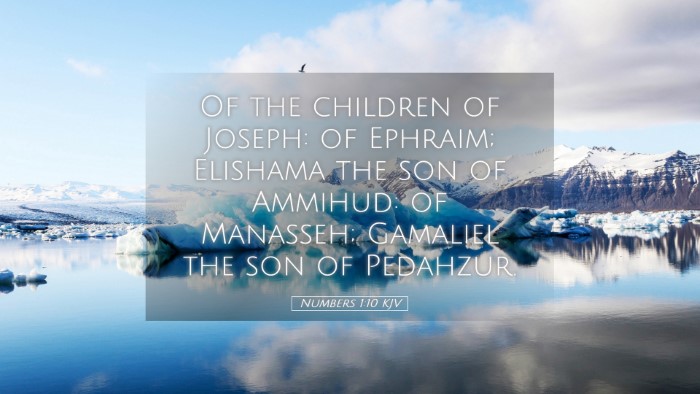Commentary on Numbers 1:10
Verse Context: Numbers 1:10 states, “And of the children of Joseph; namely, of the children of Ephraim by their generations, after their families, by the house of their fathers, according to the number of the names, from twenty years old and upward, all that are able to go forth to war.” This verse is part of the formal census that God commanded Moses to take of the Israelites in the wilderness.
General Overview
This verse emphasizes the importance of Ephraim within the tribal structure of Israel. Ephraim, as a significant tribe, plays a fundamental role in the calculations of military and demographic strength of the nation. As we explore the nuances of this verse, we will draw insights from various public domain commentaries to enrich our understanding.
Commentary Insights
Matthew Henry's Commentary
Matthew Henry highlights that the mention of Ephraim here signifies the prominence of Joseph’s sons in the Israelite community. Ephraim’s strong representation indicates the tribe’s considerable size and military capability, which is crucial as Israel prepares to enter the Promised Land. Henry draws attention to how this census reflects God’s order and authority over Israel’s organization as a nation.
Albert Barnes' Notes on the Bible
Albert Barnes notes that the census was not merely a count, but a declaration of readiness for the people of Israel. He emphasizes the qualifications of those counted—only males aged twenty years and upward, the typical age of military service in ancient Israel. This specificity underscores the notion of accountability and preparedness among the congregation of Israel.
Adam Clarke's Commentary
Adam Clarke states that Ephraim’s listing reflects a prophetic fulfillment. He posits that Ephraim, as the younger son, received the greater blessing and distinction among Joseph's lineage. Clarke points out that this precedence not only illustrates God’s sovereignty but also serves as a reminder that God can elevate whom He chooses. This dynamic becomes significant as we contemplate the roles and responsibilities within the community of faith.
Symbolism and Spiritual Lessons
- Leadership from Within: The tribe of Ephraim often represented leadership and guidance within Israel, symbolizing how God can rise up leaders from unexpected places.
- Preparation for Battle: The age qualification for military service indicates a requirement for personal readiness in spiritual warfare, which is applicable for believers today.
- Community and Identity: The gathering and numbering of tribes signify the importance of community identity among God’s chosen people, highlighting unity and purpose.
Theological Implications
This passage can be interpreted as a lesson on divine order and the significance of numbers in the biblical narrative. Each tribe’s representation not only reflects numerical strength but illustrates the underlying divine plan for Israel’s future. The careful delineation of names and ages suggests that God values every individual and their contribution to His kingdom.
Census as a Reflection of God’s Character
The act of conducting a census reveals attributes of God’s character—His attention to detail, His desire for order, and His provision for His people. Each individual counted is seen as significant in God’s eternal plan. In this context, both pastors and theologians are called to reflect on the importance of recognizing each member’s role in the body of Christ and the church's collective mission.
Application to Ministry
For pastors and church leaders, this verse serves as a reminder of the significance of organizing and enabling their congregations. Just as Israel was required to prepare for warfare, contemporary churches must equip their members for ministry, outreach, and spiritual battles against sin and darkness in today’s world.
Conclusion
Numbers 1:10, while initially appearing a mere detail in the census, reveals profound insights into God’s covenant people—their identity, preparation for mission, and the anticipation of His promised future. As we study and reflect upon this verse, may we be encouraged to recognize and embrace our unique roles within God’s community, prepared for the tasks set before us, understanding that God is always at work among us.


